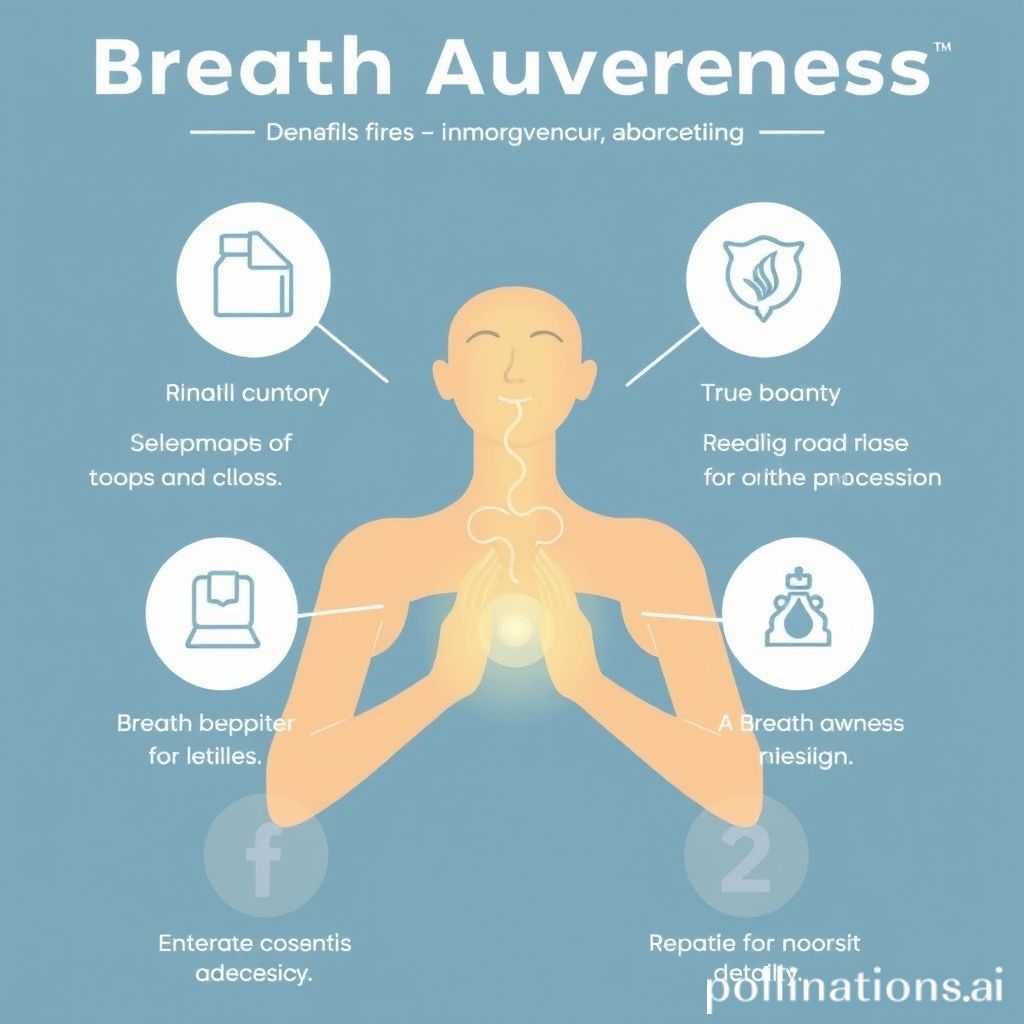Breath awareness is a simple yet powerful technique that involves focusing on your breath to calm your mind and body. This practice has been used for centuries in various cultures and is now gaining popularity in the Western world.
The benefits of breath awareness include reducing stress and anxiety, improving concentration and focus, and promoting overall well-being. In this article, we will investigate the benefits of breath awareness and how to incorporate this practice into your daily routine.
Techniques for Practicing Breath Awareness
In the realm of chakra healing and meditation, breath awareness serves as a fundamental practice to connect with the present moment and cultivate inner peace. This section explores various techniques that can be employed to amplify breath awareness.
1. Deep Breathing Exercises
Deep breathing exercises involve taking slow, deliberate breaths, allowing for the expansion of the diaphragm and the filling of the lungs with fresh, oxygen-rich air. This technique promotes relaxation and reduces stress levels. By focusing on the breath, individuals can channel their energy inwards and attain a state of tranquility.
One effective deep breathing exercise is the 4-7-8 technique. Inhale deeply through the nose for a count of 4, hold the breath for a count of 7, and exhale slowly through the mouth for a count of 8. Repeat this cycle several times, allowing the breath to anchor your attention and create a sense of calm.
2. Mindful Breathing Techniques
Mindful breathing involves paying attention to the breath without judgment or attachment. It requires individuals to observe the sensations of each inhalation and exhalation, noticing the subtle changes in rhythm and depth. By practicing mindful breathing, individuals can cultivate a focused and centered state of mind.
One simple mindful breathing technique is the “4-4-4” method. Breathe in deeply through the nose for a count of 4, hold the breath for a count of 4, and exhale slowly through the mouth for a count of 4. This technique encourages mindfulness and helps individuals become fully present in the moment.
3. Box Breathing Method
The box breathing method, also known as square breathing, is a technique that involves equalizing the length of inhalation, holding the breath, exhalation, and holding the breath again. This method can help regulate the autonomic nervous system, promoting a sense of calm and balance.
To practice box breathing, imagine tracing a square with your breath. Inhale deeply for a count of 4, hold the breath for a count of 4, exhale slowly for a count of 4, and hold the breath again for a count of 4. Repeat this pattern, visualizing the shape of a square with each breath.
| Technique | Benefits |
|---|---|
| Deep Breathing Exercises | Reduces stress levels, promotes relaxation |
| Mindful Breathing Techniques | Cultivates focus and centeredness |
| Box Breathing Method | Regulates autonomic nervous system, promotes calm and balance |

Health Benefits of Breath Awareness
Breath awareness is a powerful technique that can have numerous positive effects on our overall health and well-being. By focusing on our breath, we can experience a range of benefits that contribute to our physical, mental, and emotional well-being.
1. Stress Reduction and Relaxation
One of the primary benefits of breath awareness is its ability to reduce stress and promote relaxation. When we pay attention to our breath, we can slow down our breathing and activate the body’s relaxation response. This can help to lower stress levels, calm our mind, and create a sense of inner peace.
2. Improved Focus and Concentration
Practicing breath awareness can also empower our focus and concentration. By bringing our attention to our breath, we train our mind to stay present and avoid distractions. This can improve our ability to concentrate on tasks, optimize our productivity, and boost our overall cognitive function.
3. Enhanced Respiratory Function
Another significant benefit of breath awareness is its positive impact on our respiratory function. By practicing deep, mindful breathing, we can strengthen our respiratory muscles, increase our lung capacity, and improve the efficiency of our breathing. This can lead to better oxygenation of our body, increased energy levels, and improved overall respiratory health.
Breath Awareness for Physical Well-being
Breath awareness is a powerful practice that can greatly contribute to your physical well-being. By focusing on your breath, you can experience increased energy levels, improved digestion and detoxification, and a boosted immune system.
1. Increased Energy Levels
When you become aware of your breath and consciously deepen your inhalations and exhalations, you provide your body with a fresh supply of oxygen. This oxygen is essential for energy production in your cells, resulting in increased vitality and alertness.
2. Improved Digestion and Detoxification
Deep breathing stimulates the parasympathetic nervous system, which is responsible for promoting digestion and detoxification. As you take in more oxygen and release carbon dioxide, your body becomes more efficient at eliminating toxins and waste products, leading to improved digestive function and a healthier detoxification process.
3. Boosted Immune System
Your breath is directly connected to your immune system. Deep breathing activates the relaxation response in your body, reducing stress and lowering the production of stress hormones. This, in turn, strengthens your immune system, making you more resilient to illnesses and infections.

Breath Awareness for Mental Well-being
1. Reduced Anxiety and Depression
Breath awareness is a powerful tool that can help in reducing anxiety and depression. By focusing on your breath, you can bring your attention to the present moment and calm your mind. Deep, slow breaths can activate the parasympathetic nervous system, which promotes relaxation and decreases the production of stress hormones. This can lead to a decrease in anxiety and a more positive mood.
2. Enhanced Emotional Stability
Practicing breath awareness can also contribute to enhanced emotional stability. When you pay attention to your breath, you become more aware of your emotions and how they manifest in your body. This increased self-awareness can help you better understand and regulate your emotions, leading to a greater sense of emotional stability and resilience.
3. Improved Sleep Quality
Another benefit of breath awareness is improved sleep quality. Many individuals struggle with racing thoughts and an overactive mind when trying to sleep. By practicing breath awareness before bed, you can quiet your mind and relax your body, making it easier to fall asleep and enjoy a restful night’s sleep. Deep, rhythmic breathing can also activate the relaxation response, preparing your body for a state of deep relaxation and rejuvenation.
| Benefit | Description |
|---|---|
| Reduced Anxiety and Depression | By focusing on your breath, you can reduce anxiety and depression by promoting relaxation and decreasing stress hormones. |
| Enhanced Emotional Stability | Breath awareness helps you become more self-aware of your emotions and regulate them, leading to greater emotional stability. |
| Improved Sleep Quality | Practicing breath awareness before bed can quiet the mind and relax the body, leading to improved sleep quality. |

Embedding Breath Awareness into Daily Routine
Developing a daily breath awareness practice can have profound effects on our overall well-being. By bringing attention to our breath, we can cultivate a sense of calm and presence in our lives. Here are some ways to incorporate breath awareness into your daily routine:
1. Morning Breath Awareness Practice
Start your day by dedicating a few moments to focus on your breath. Find a quiet and comfortable space where you can sit or lie down. Close your eyes and bring your attention to your breath. Notice the inhale and exhale, the rise and fall of your abdomen. Allow your breath to naturally flow, without trying to control it. This simple practice can help you start your day with a sense of calm and clarity.
2. Breath Awareness During Exercise
Whether you’re engaging in a rigorous workout or a gentle yoga session, enmeshing breath awareness can augment your physical and mental experience. Pay attention to your breath as you move through different exercises or poses. Notice how your breath changes with each movement and how it can help you find balance and stability. By staying connected to your breath, you can optimize your exercise routine and deepen your mind-body connection.
3. Breath Awareness Before Bedtime
Before you drift off to sleep, take a few moments to bring awareness to your breath. Lie down in a comfortable position and close your eyes. Slowly inhale through your nose, allowing your abdomen to rise, and exhale through your mouth, letting go of any tension or stress. This practice can help calm your mind, release physical tension, and prepare you for a restful night’s sleep.
To further augment your absorbing of the benefits of breath awareness, let’s take a look at the following table:
| Benefits of Breath Awareness | |
|---|---|
| 1. Stress Reduction: | By focusing on your breath, you can activate the relaxation response and reduce stress levels. |
| 2. Improved Focus: | Breath awareness can optimize concentration and improve your ability to stay present in the moment. |
| 3. Emotional Regulation: | Connecting with your breath can help you navigate and regulate your emotions more effectively. |
Read More:
1. Stress Relief Through Breath Awareness Mastery
2. Retreat into Breath Awareness: Find Inner Harmony